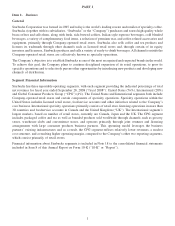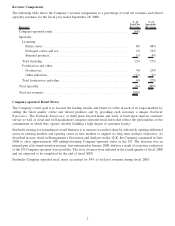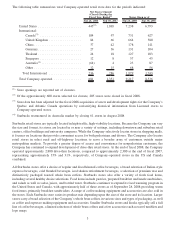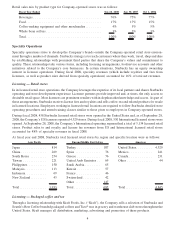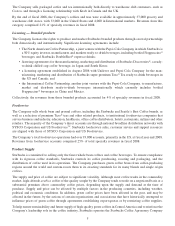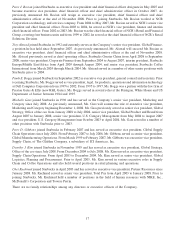Starbucks 2008 Annual Report Download - page 17
Download and view the complete annual report
Please find page 17 of the 2008 Starbucks annual report below. You can navigate through the pages in the report by either clicking on the pages listed below, or by using the keyword search tool below to find specific information within the annual report.•Starbucks is increasingly dependent on the success of its International operating segment in order to
achieve its growth targets.
The Company’s future growth will increasingly depend on the growth and sustained profitability of its International
operating segment. Some or all of the Company’s International market business units (“MBUs”), which Starbucks
generally defines by the countries or regions in which they operate, may not be successful in their operations or in
achieving expected growth, which ultimately requires achieving consistent, stable net revenues and earnings. The
performance of the International operating segment may be adversely affected by economic downturns in one or
more of the Company’s large MBUs. Additionally, some factors that will be critical to the success of International
MBUs are different than those affecting the Company’s US stores and licensees. Tastes naturally vary by region, and
consumers in new international markets into which Starbucks and its licensees expand may not embrace Starbucks
products to the same extent as consumers in the Company’s existing markets. Occupancy costs and store operating
expenses are also sometimes higher internationally than in the United States due to higher rents for prime store
locations or costs of compliance with country-specific regulatory requirements. Because many of the Company’s
International operations are in an early phase of development, operating expenses as a percentage of related
revenues are often higher compared to US operations. The Company’s International operations are also subject to
additional inherent risks of conducting business abroad, such as:
• foreign currency exchange rate fluctuations;
• changes or uncertainties in economic, legal, regulatory, social and political conditions in the Company’s
markets;
• interpretation and application of laws and regulations;
• restrictive actions of foreign or United States governmental authorities affecting trade and foreign invest-
ment, including protective measures such as export and customs duties and tariffs and restrictions on the
level of foreign ownership;
• import or other business licensing requirements;
• the enforceability of intellectual property and contract rights;
• limitations on the repatriation of funds and foreign currency exchange restrictions;
• in developing economies, the growth rate in the portion of the population achieving targeted levels of
disposable income may not be as fast as the Company forecasts;
• difficulty in staffing, developing and managing foreign operations, including ensuring the consistency of
product quality and service, due to distance, language and cultural differences; and
• local laws that make it more expensive and complex to negotiate with, retain or terminate employees.
Moreover, many of the foregoing risks are particularly acute in developing counties, which are important to the
Company’s long-term growth prospects.
•Starbucks International segment is highly dependent on the financial performance of its Canada, Japan
and UK markets; any significant increases in costs or significant declines in net revenues or profit contri-
bution from one or more of these markets could have a material adverse impact on the results of opera-
tions of the International segment.
Starbucks Canada, Japan and UK markets account for a significant portion of the net revenues and profit
contribution of the Company’s International operating segment. Any significant decline in the financial perfor-
mance of one of these key markets may have a material adverse impact on the results of operations of the entire
Starbucks International segment, if not partially or fully offset by positive financial performance from the other two
major markets.
11


